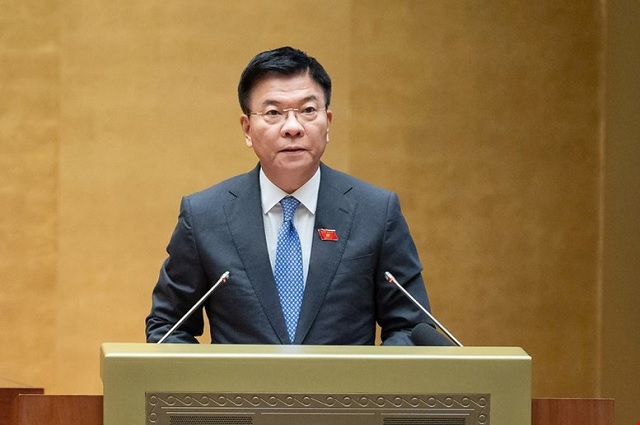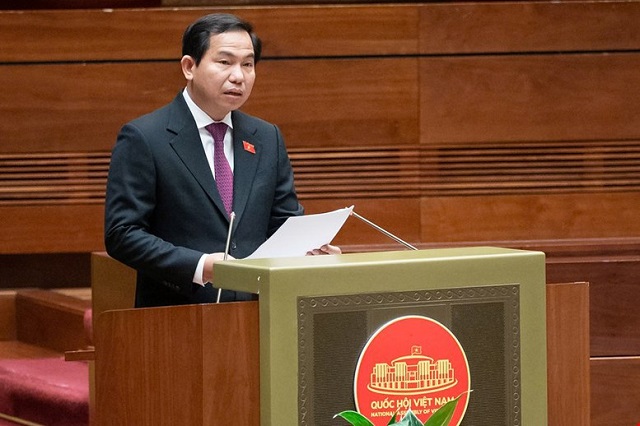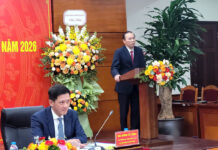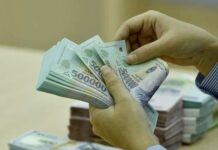Continuing the working agenda of the 8th session of the 15th National Assembly, on the morning of November 23, Deputy Prime Minister Le Thanh Long presented a report on the draft Law on Management and Investment of State Capital in Enterprises.

Deputy Prime Minister Le Thanh Long presented a report on the draft Law on Management and Investment of State Capital in Enterprises
|
According to the Deputy Prime Minister, in order to implement the Party’s guidelines and policies and the State’s policies on improving the efficiency of management and use of state capital invested in production and business in enterprises, and to meet new requirements from practical management and international integration, it is necessary to overcome the limitations and shortcomings of the current Law on Management and Use of State Capital Invested in Production and Business at Enterprises, Law No. 69/2014/QH13, ensuring the consistency and uniformity of the Vietnamese legal system. The Government presents the draft Law on Management and Investment of State Capital in Enterprises to replace Law No. 69/2014/QH13.
Regarding the application scope, when formulating the policy, it was determined that “Enterprises with other state capital investment” are enterprises with investment capital of over 50% of their charter capital, in which there is a 100% state-owned enterprise with direct investment capital.
During the process of concrete research in the process of drafting the Law, in order to ensure unity with the principle of state management according to investment capital flow and in accordance with the actual contributed capital in enterprises, on the basis of proposals from enterprises, ministries, sectors and related units, the Government agreed to not include enterprises with other forms of state capital investment in the scope of adjustment of this Law, and assigned responsibility to enterprises with state-owned investment capital.
Accordingly, the subjects of application include: State-owned enterprises as prescribed in the Law on Enterprises; credit institutions in which the State holds more than 50% of the charter capital (excluding Deposit Insurance and Policy Banks); representative agencies of the owner of capital, and representatives of the owner of capital at state-owned enterprises as prescribed in the Law on Enterprises and credit institutions in which the State holds more than 50% of the charter capital; agencies, organizations and individuals related.
In terms of principles and order of profit distribution after tax, the Government proposes to deduct no more than 50% into the Development Investment Fund for enterprises, and the management and use of the Development Investment Fund for enterprises shall be carried out in accordance with regulations of the Government. The remaining amount, after using and allocating to the funds as prescribed, the enterprise shall pay to the state budget.
According to this option, the estimated amount of payment to the state budget from profit, dividend and dividend sources will decrease by about VND 19,847 billion/year (according to the settlement of the state budget revenue in 2021 approved by the National Assembly, the total amount of payment to the state budget from dividends, profits and after-tax profits of enterprises was VND 69,463 billion) and enterprises will use this source in accordance with regulations of the Government.
Regarding the mechanism for paying salaries and bonuses to employees in enterprises, the person appointed, introduced or hired by the representative agency of the owner of capital to work directly in the enterprise, when proposing to build the Law, determined to supplement the content of this expenditure in accordance with the spirit of Resolution No. 27-NQ/TW dated May 21, 2018 of the 7th Plenum of the 12th Party Central Committee.
Receiving the opinions, the Government proposes not to stipulate the contents of the mechanism for paying salaries in the draft Law, and stipulates at Point 15, Article 12 “Enterprises are allowed to pay salaries, wages and remuneration to laborers according to the efficiency and business results of the enterprises”
Ensuring SOEs operate on a market mechanism
 Chairman of the National Assembly’s Finance and Budget Committee (NAFC) Le Quang Manh presented a report on the draft Law
|
Reviewing the draft law, on the issue of profit distribution and fund usage, Mr. Le Quang Manh, Chairman of the National Assembly’s Finance and Budget Committee, said that the NAFC basically agreed with the Government’s report on the necessity to promulgate the Law on Management and Investment of State Capital in Enterprises to replace the Law on Management and Use of State Capital Invested in Production and Business at Enterprises.
The Committee believes that the provisions of the draft Law will contribute to institutionalizing the Party’s views and guidelines on continuing to restructure, renovate and improve the efficiency of SOEs; ensuring that SOEs operate on a market mechanism, respecting and enhancing the autonomy and self-responsibility of enterprises; strengthening inspection and supervision by the State in capital management and investment in enterprises.
To perfect the draft Law, the NAFC requested the drafting agency to continue reviewing the specific provisions in the draft Law to fully and synchronously institutionalize the above viewpoints and principles.
Regarding the purpose and viewpoint of building the Law, the majority of opinions agreed with the viewpoint of strongly reforming administrative procedures in the management and investment of state capital in enterprises associated with clear division and strong delegation of authority to the representative agency of the owner of capital and enterprises; separating the functions and tasks of state management agencies and the representative agency of the owner of capital from the production and business activities of enterprises as mentioned in the Government’s Report.
However, some contents in the draft Law need to be further amended to remove existing shortcomings and obstacles.
Regarding the scope of adjustment and subjects of application, the NAFC believes that the scope of adjustment and subjects of application stipulated in the draft Law are generally suitable and consistent with the provisions on SOEs in the Law on Enterprises.
However, in addition to enterprises with more than 50% state capital, there are currently other types of enterprises with state capital investment that are not included in the scope of adjustment of this draft Law.
Therefore, it is suggested to consider supplementing the scope of management and investment of state capital with general principles in this draft Law, and at the same time, assigning the Government to detail the management measures and levels for these enterprises with state investment capital.
Regarding profit distribution and fund usage, the NAFC believes that it is appropriate to allocate up to 50% of post-tax profits to the Development Investment Fund for enterprises with 100% state-owned investment capital.
The draft Law has adjusted the regulations on the purpose of using the Development Investment Fund for enterprises in the direction that it will be done in accordance with the Government’s regulations. The NAFC agreed with the draft Law, but suggested supplementing the draft Decree guiding the implementation of this content to ensure compliance with the Law on Promulgation of Legal Documents.
At the same time, the draft Decree needs to specifically regulate the competence, decision-making, scope and content of using the Fund, ensuring the principle that state capital after being invested in enterprises is considered as assets and capital of the enterprises.















